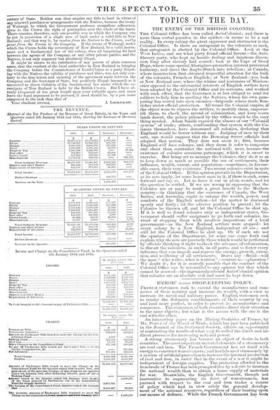TOPICS OF THE DAY.
THE ENEMY OF THE BRITISH COLONIES.
THE Colonial Office has been called Anti-Colonial ; and there is more than verbal paradox in the epithet-it seems to be a sad reality. In every colony the great oppressor and obstructer is the Colonial Office. Is there an antagonist to the colonists as such, that antagonist is abetted by the Colonial Office. Look at the West Indies, and see what party found official favour-the Anti- Slavery party, who kept up hostile feeling and injurious dissen- sion long after slavery had ceased : look at the Cape of Good Hope, where some special Aborigines-protection interest prevented harmony, and drove the Anglo-Dutch into rebellion ; at Canada, where insurrection first obtained respectful attention for the bulk of the colonists, French or English ; at New Zealand-yes, look at New Zealand now, where the whims and jealousies of Mission- aries opposed to the substantial interests of English settlers have been adopted by the Colonial Office and its servants, and worked with such effect, that the Governor is at last obliged to send for soldiers to help him in quelling the Natives, whom his own pam- pering has reared into open enemies-brigands whose trade flou- rishes under official protection. All round the Colonial empire, if. the object were to repress the settlers, to mortify them, empover- ish them, to check the spread of colonization, and keep waste lands desert, the policy pursued by the Office would be the very thing needed. Adam Smith exposed the abuses of our "colonial system" of trade ; others, confounding that system with the Co- lonies themselves, have denounced all colonies, declaring that England would be better without any. Judging of men by their • acts, one would suppose that the Downing Street officials had adopted that notion. They dare not avow it ; first, because England will have colonies, and they deem it safer to temporize and cheat than contradict the national will ; next, because the existence of colonies occasions patronage, which it is sweet to exercise. But being set to manage the Colonies, they do it so as to keep down as much as possible the use of settlements, their influence, wealth, extent, and population-sometimes, in favour- able cases, their very existence. nvo recent colonies exist in spite of the Colonial Office. If this opinion prevails in the Department, as its acts imply, let some honest man in it, if there is such, come forward and say so. Let us have it out in plain words, and let the question be settled. If we are wrong in supposing that the Colonies are or may be made a great benefit to the Mother-- country-in thinking that the existence of Canada, the West Indies, and Australia, ought to enlarge the wealth, power, and comforts of the English nation-let the matter be discussed openly and fairly ; let the adverse position be proved ; let the Colonies be thrown off, and let the Colonial Office be shut up. If it is well to found, colonies only as independent states, Go- vernment should suffer emigrants to go forth and colonize, in- stead of stopping them with needless impositions of a local government-as the New Zealand settlers were stopped : let every colony be a New England, independent ab eve ; and still let the Colonial Office be shut up. Or if such are not the opinions of the Department, let some one come forth and explain why the acts are precisely those which would be performed by officials thinking it right to check the advance of colonization, to thwart the colonists, as such, in all parts, and to foster every influence that can impede and repress the energy, growth, exten- sion, and wellbeing of all settlements. Dares any official-will the man " who writes what is written"-venture an explanation We doubt it ; for it is scarcely possible that the conduct of the Colonial Office can be reconciled to any opinion but that which cannot be avowed-the ingeniously-absurd Anti-Colonial opinion that colonies are an absolute evil and must be kept down.


























 Previous page
Previous page